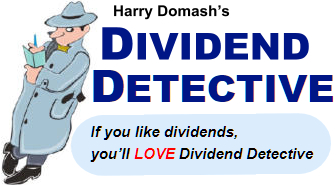|
Too many stocks, too
little time? Click
here to subscribe to Dividend
Detective |
Corporate Bond Basics
Get Up to Speed on Corporate Bonds
• About
Corporate Bond Ratings
click here
• Recommended Corporate Bonds
(Premium Feature)
click here
Most corporate bonds are bought and sold by
individual dealers. Some keep an inventory, and buy and sell for their own
account, while others act as agents for other dealers. Unlike stocks,
there is no national quotation system for bonds, and you’d most likely pay
different prices for the same bonds, purchased at the same time, from
different dealers. Further, the dealer’s price normally includes a markup
reflecting the dealer’s costs and profit.
Bonds are usually sold in $5,000
denominations, but are quoted as if the bonds were traded in $100
increments. For instance, a bond price of $105 means that the bond traded
at $105 per $100 of face value, or at a five percent premium.
About Bonds
Here are definitions that you’ll need to
analyze bonds:
Callable
Bonds can be callable or non-callable. If callable, the corporation can
redeem the bonds before the scheduled maturity date. Most bonds are
non-callable.
Call Date
Date that bond can be called.
Call Price
Price issuer will pay to redeem bond. Usually the same as the issue price.
Convertible
Preferred holders have the right to convert shares to common stock at
predetermined ratio after specified date. This gives preferred holders a
chance to benefit from the common stock’s share price appreciation.
Coupon Rate
Most corporate bonds pay a specified fixed interest rate, called the
coupon rate, based on the issue price.
Current Yield
Your return rate on the bond, which is typically different than the bond
rate. For instance, say that you buy a bond with a 6 percent interest rate
(based on its original $100 issue price) for $95. You receive $6.00 in
interest, annually, but your yield is 6.3 percent (6 divided by 95) since
you only paid $95 for the bond.
CUSIP
A unique identification number for every security whether common stock,
preferred stock, or a bond.
Issue Price
Original bond sales price.
Junk Bonds
Corporate bonds rated below investment grade.
Maturity Date
The date when the corporation must redeem the bond for its face value.
Bonds with maturities of four years or less are termed short-term bonds,
those with maturities of more than 12 years are deemed long-term, and
those between are medium-term bonds.
Yield to Maturity
The total of principal
and interest payments that you would receive if you held the bond to
maturity. For instance, if you bought a 6 percent bond with a maturity
date 12 months out for $95, your yield to maturity is $106 (the $100
principal you’ll receive plus $6 interest) divided by the $95 that you
paid, or 11.6 percent.
Investing in Bonds
Most investors purchase bonds for the income.
To reduce income volatility, many bond buyers employ a laddering strategy.
Bond Ladders
When you buy a bond, you run the risk that interest rates might be lower
when the bond matures, forcing you to reinvest your principal in a bond
yielding less income than the bond that you sold.
Rather than buying a single bond, the
laddering strategy involves buying four or five different bonds that
mature at different dates. For instance, you might buy separate bonds that
mature in one, two, three, four, and five years out. When your first bond
matures (after one year), you would reinvest your principal into a bond
maturing in five years. Two years after your first investment, you would
reinvest the principal from the bond maturing then into another five-year
bond. By following that strategy, you will always hold bonds maturing one,
two, three, four, and five years out.
The bond ladder reduces your
income volatility because only 20% of your bonds mature at any given time.
If interest rates have dropped, you’ll still receive the higher rates from
80% of your investment. |
